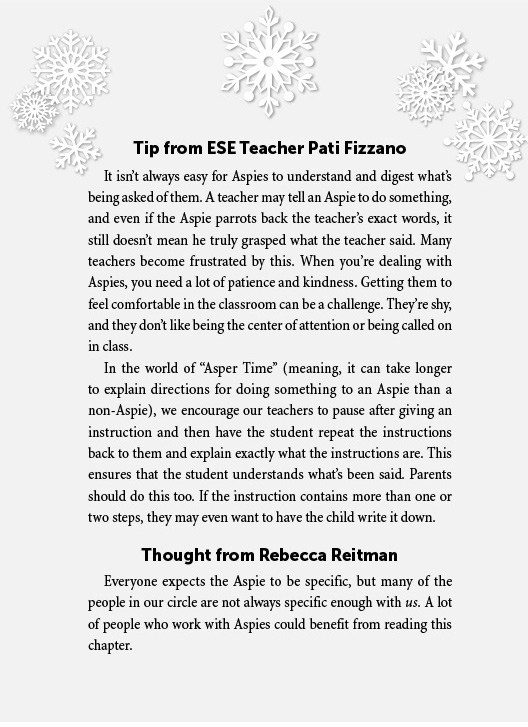
14 Taking Things Literally: “Why Did They Say
I’m Not Playing with a Full Deck?”
One morning I shot an elephant
in my pajamas. How he got into my
pajamas I’ll never know.
—Groucho Marx as Captain Spaulding in
Animal Crackers.
Helpful Hint: Aspies take everything literally that is said to them or that they read. Not only that, they can’t figure out when they’re not supposed to take things literally. Be judicious in your choice of idioms and colloquialisms. When you use one, teach the Aspie what it means. Teach them as they occur.
Principle: Many Aspies interpret the words said to them (and, perhaps to a lesser extent, the words they read) quite literally. Consider all the things you might say in jest or exaggeration during the course of a day. I’m bending over backward to please you. That trip to the supermarket cost me an arm and a leg. They’re dropping like flies. He was so wound up, he was bouncing off the walls. I’ve got an axe to grind with him. Who’d believe that anyone could take them literally?
Well, don’t let their high IQs fool you. Aspies could. And will. The idioms, colloquialisms, exaggerations, and folksy figures of speech that account for so much of our spoken language are confusing to Aspies because they take them literally.

Imagine you’re an Aspie. You’re waiting for a meeting to start. The neurotypicals next to you are joking around. They’re trying to include you, but you’re not comfortable being around them because you can’t tell when they’re being serious and when they’re not. You’re not sure when to laugh. Someone says, “Janet said if her boss gives her one more stupid assignment, she’s gonna blow her top!” and starts laughing. Why is everyone laughing? My dad uses the expression “blowing my top” to refer to my having a meltdown. Why is the idea of someone else blowing their top funny?

Imagine you’re an Aspie. You’re driving your car and you’ve gotten lost. Even though you’re nineteen and know you shouldn’t talk to strangers, you pull over and ask a kindly looking older couple for directions to 508 Main Street. The man smiles and says, “You can’t get there from here.” Awkward pause. Is that supposed to be funny? Are you supposed to ask the question again? Or are you supposed to backtrack all the way to where you started from to get where you’re going? The seconds seem like minutes. The person is still smiling. What should you do next?

Imagine you’re an Aspie. You are at a party and the guy you’re talking to says he’s just pulling your leg. But your leg is in your pants and no one’s pulling on it. Are you supposed to laugh? Now someone else says, “Hey, look outside, it’s raining cats and dogs!” You look out the window for animals falling from the sky, but all you see are sheets of rain. As your anxiety climbs, your brain can’t function to figure out things that it could normally figure out.
ACTION PLAN: It would be easier if you said exactly what you meant in the first place, without resorting to a figure of speech. But that won’t prepare Aspies for the real world, where people use idioms and colloquialisms all the time. (The same applies to teaching them how to read body language and social cues.) If you or someone else uses an idiomatic expression or a collo-quialism in talking to your Aspie, explain the literal translation of the phrase. Teach your Aspie the most common colloquialisms used in the real world, and explain to her what they mean.
“I don’t know what I don’t know.”
Rebecca felt that her apartment in Fort Lauderdale was too close to her well-intentioned parents, whose tyranny she was trying to escape.19 After she learned of the independent living facility and had researched it on her own, she asked if she could move there.
19 The parents of an Aspie often speak of feeling unwanted by their offspring. While this can certainly be said about the parents of neurotypical teenagers, Aspies can be positively brutal to their parents. Another reason along with speaking their minds in absolute honesty is the anger they feel because their parents don’t understand what they’re going through.
Her decision took her mom and me by surprise. The clueless parents were about to become a little bit less clueless. Rebecca had figured that for her to maximize her independence, she needed to find a place where she could have her own apartment yet receive some third-party coaching (not from her parents!), help with transportation, since she did not drive, and a resident manager with special training. The facility was on a campus that included an administration building, an auditorium, a few small parochial schools, and other programs.
During the application process, Rebecca e-mailed Kate, the supervisor of the independent living facility, to ask if there was shopping within walking distance of the facility, because her seizure disorder prevented her from driving. Kate e-mailed back that there were so many shopping centers and stores close by that it might be easier for her to list the ones that weren’t nearby. She then listed fifteen stores she thought Rebecca would like to shop at that were easy to walk to.
Kate had cc’d me on the e-mail, and the next day as I was driving Rebecca, I said, “Wasn’t that nice of Kate to list all those stores you could walk to if you lived there?”
“Dad, you really ought to read your e-mails more carefully. The list Kate sent me is of the stores that are not close by,” Rebecca said.
Without thinking, I replied, “Rebecca, it wouldn’t make sense for her to list the stores that are not close by. You must know that.”
I watched my daughter’s body language instantly change. She slumped in the passenger seat. Her shoulders sagged, and she muttered, “Dad, that’s the problem. Sometimes I don’t know what I don’t know.”
My heart sank. In that moment, I truly realized how difficult it must be for my daughter or any other Aspie. “I don’t know what I don’t know” has to be a cause of terrible anxiety. It means that one minute they can be confident that they clearly understand what’s going on in a given situation, only to discover the next minute that they’re way off base. What a shock that must be. Yet as bad as Rebecca felt, she felt worse when she saw the disappointment and the sadness on the face of her father—the same father who spoke without thinking.
(Reliving this moment always makes me sad. But it also makes me glad that I’m writing this book, so that you, the reader, will gain some of these clues that I wish I’d had back then. Just remember, it’s not about you. It’s about your Aspie.)
Not knowing what you don’t know can be really, really tough. But keep in mind that Aspies can and do learn. There is hope. There are Aspertools. Give them the opportunity to learn the tools they need. They can do it. As actress Darby Stanchfield utters in her brilliant portrayal of a college student Aspie in the movie The Square Root of 2, “Dad, have a little faith.”
When Rebecca was growing up, she often said, “Dad, have confidence in me.” It’s a double-edged sword for a parent, because we all want to protect our children, but if we coddle them too much, they won’t learn from their failures and mistakes. This is magnified when you are the parent of an Aspie. On the one hand, Rebecca would think, “My dad thinks I can do things that my brain can’t do.” On the other hand, if I tried to coddle and protect her and tell her that I’d understand if she failed, then she’d think, “Dad has no confidence that I can do these things.” Again, my advice is to be patient and, as the line in the movie says, have faith!
(When I wrote that line for the screenplay, I cried. I cried again when Darby said it so perfectly on the first take on the set, again when I first heard her say it on the screen, and even now, as I write it for the book.)


